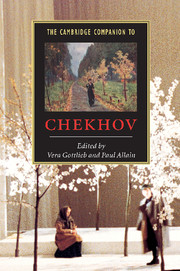Book contents
- Frontmatter
- Part 1 Chekhov in context
- Part 2 Chekhov in production
- 4 From Platonov to Piano
- 5 Chekhov's one-act plays and the full-length plays
- 6 Ivanov: the invention of a negative dramaturgy
- 7 The Seagull: an adaptation
- 8 Notes from a director: Uncle Vanya
- 9 Notes from a director: Three Sisters
- 10 The Cherry Orchard
- 11 Acting Chekhov: 'a friend to the actor'
- 12 The scenography of Chekhov
- 13 Chekhov on screen
- 14 Chekhov on the Russian stage
- 15 Directors' Chekhov
- Part 3 Chekhov the writer
- Appendix 1 Chekhov's works: primary sources from the Russian - Variations of English titles from the Russian
- Appendix 2 Selected stage productions
- Appendix 3 Selected screen versions
- Appendix 4 Illustrations
- Selected bibliography
- Index of Works by Checkov
- General Index
15 - Directors' Chekhov
from Part 2 - Chekhov in production
Published online by Cambridge University Press: 28 May 2006
- Frontmatter
- Part 1 Chekhov in context
- Part 2 Chekhov in production
- 4 From Platonov to Piano
- 5 Chekhov's one-act plays and the full-length plays
- 6 Ivanov: the invention of a negative dramaturgy
- 7 The Seagull: an adaptation
- 8 Notes from a director: Uncle Vanya
- 9 Notes from a director: Three Sisters
- 10 The Cherry Orchard
- 11 Acting Chekhov: 'a friend to the actor'
- 12 The scenography of Chekhov
- 13 Chekhov on screen
- 14 Chekhov on the Russian stage
- 15 Directors' Chekhov
- Part 3 Chekhov the writer
- Appendix 1 Chekhov's works: primary sources from the Russian - Variations of English titles from the Russian
- Appendix 2 Selected stage productions
- Appendix 3 Selected screen versions
- Appendix 4 Illustrations
- Selected bibliography
- Index of Works by Checkov
- General Index
Summary
A Selected Glossary giving details of directors/actors mentioned can be found at the end of this chapter.
Shortly before his death, when asked to name the actors he considered the best interpreters of his plays, Chekhov cited three members of the St Petersburg Imperial Theatre who had appeared in the first productions of Ivanov and The Seagull. His slighting omission of actors of the Moscow Art Theatre reflected the nineteenth-century attitude that a player was supposed to enhance a playwright's words through virtuosity and instinctive affinity. However gifted the Art Theatre actors may have been, Chekhov regretted that their individual talents were subject to the overriding concept of a director.
The irony is that Chekhov's own plays had themselves evolved from vehicles for histrionic display into ensemble pieces, best implemented by a masterful director. His playwriting career culminated at a time when the director was emerging as prime mover in the modernist theatre. In common with the Wagnerian notion of Gesamtkunstwerk, the stagecraft promoted by Appia, Craig, Stanislavsky and Reinhardt required every component in the mise-en-scene to be integrated and controlled by a single vision. Chekhov's drama benefited from this development: actors might give outstanding performances of specific roles, but his plays rarely caught on with audiences unless packaged by a director into a comprehensible and congruent format. A comparison of, say, the romantic Hamlets of Kean, Devrient and Mochalov makes sense; but to compare the Ranevskayas of Valentina Cortese, Alia Demidova and Jutta Lampe to any advantage one must set them in the contexts created by Giorgio Strehler, Anatoly Efros and Peter Stein.
- Type
- Chapter
- Information
- The Cambridge Companion to Chekhov , pp. 176 - 200Publisher: Cambridge University PressPrint publication year: 2000



